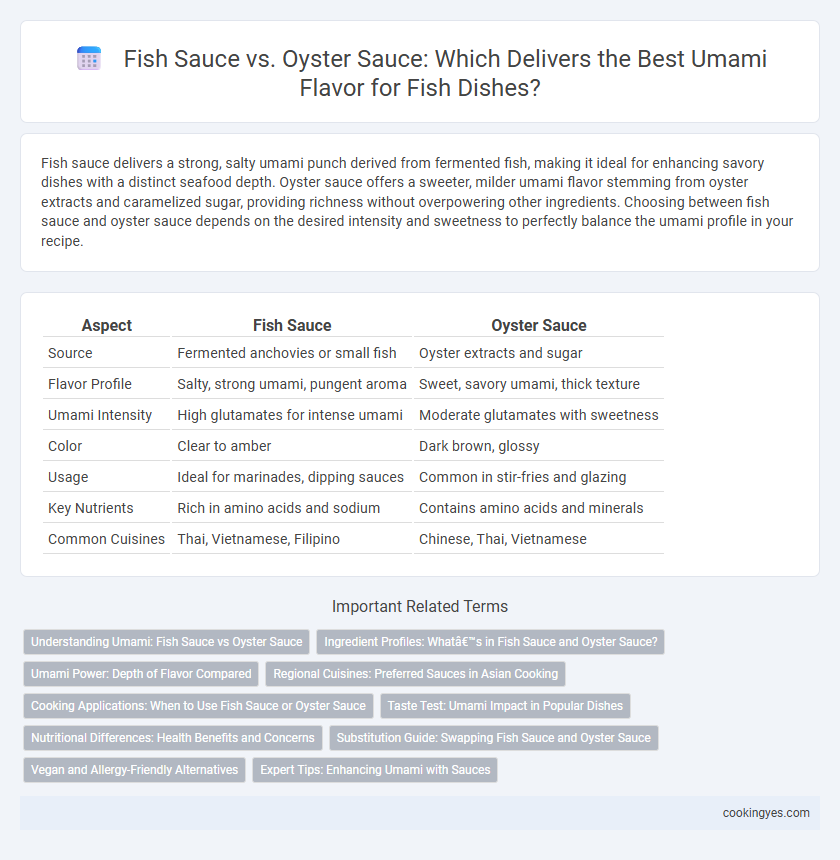Fish sauce delivers a strong, salty umami punch derived from fermented fish, making it ideal for enhancing savory dishes with a distinct seafood depth. Oyster sauce offers a sweeter, milder umami flavor stemming from oyster extracts and caramelized sugar, providing richness without overpowering other ingredients. Choosing between fish sauce and oyster sauce depends on the desired intensity and sweetness to perfectly balance the umami profile in your recipe.
Table of Comparison
| Aspect | Fish Sauce | Oyster Sauce |
|---|---|---|
| Source | Fermented anchovies or small fish | Oyster extracts and sugar |
| Flavor Profile | Salty, strong umami, pungent aroma | Sweet, savory umami, thick texture |
| Umami Intensity | High glutamates for intense umami | Moderate glutamates with sweetness |
| Color | Clear to amber | Dark brown, glossy |
| Usage | Ideal for marinades, dipping sauces | Common in stir-fries and glazing |
| Key Nutrients | Rich in amino acids and sodium | Contains amino acids and minerals |
| Common Cuisines | Thai, Vietnamese, Filipino | Chinese, Thai, Vietnamese |
Understanding Umami: Fish Sauce vs Oyster Sauce
Fish sauce delivers a potent umami flavor derived from fermented anchovies, offering a salty and savory depth essential in Southeast Asian cuisine. Oyster sauce provides a milder, slightly sweet umami taste extracted from oysters, enhancing dishes with a rich, glossy finish common in Chinese cooking. Both sauces amplify umami by utilizing natural glutamates but differ in intensity and sweetness, influencing their specific culinary applications.
Ingredient Profiles: What’s in Fish Sauce and Oyster Sauce?
Fish sauce primarily consists of fermented anchovies, salt, and water, creating a strong, salty umami flavor rich in amino acids like glutamates. Oyster sauce is made from oyster extracts, sugar, salt, and sometimes cornstarch, offering a sweeter, thicker texture with a savory umami intensity derived from natural oyster brine. Understanding these ingredient profiles helps in choosing between the bold, pungent taste of fish sauce and the mellow, slightly sweet umami of oyster sauce for culinary applications.
Umami Power: Depth of Flavor Compared
Fish sauce delivers a robust umami punch with its potent, salty, and slightly fermented flavor, making it a staple in Southeast Asian cuisines. Oyster sauce offers a mellower, sweeter depth, enriched with caramelized oyster extracts that provide a complex yet smooth umami profile. Both sauces enhance dishes with unique umami power, but fish sauce leans towards intensity while oyster sauce balances richness with subtle sweetness.
Regional Cuisines: Preferred Sauces in Asian Cooking
Fish sauce is a fundamental umami enhancer in Southeast Asian cuisines such as Thai, Vietnamese, and Filipino, known for its strong, salty, and tangy profile derived from fermented anchovies. Oyster sauce, with its thicker consistency and sweeter, milder umami flavor, is a staple in Chinese cooking and popular in Cantonese dishes, adding depth without overpowering other ingredients. Regional preferences highlight fish sauce's bold saltiness in dishes like Thai papaya salad, while oyster sauce enriches stir-fries and braises in southern Chinese and Vietnamese-Chinese fusion cuisine.
Cooking Applications: When to Use Fish Sauce or Oyster Sauce
Fish sauce, with its strong, salty, and pungent umami flavor, is ideal for Southeast Asian dishes like Thai curries, Vietnamese pho, and dipping sauces where a bold depth is needed. Oyster sauce provides a sweeter, milder umami taste and thicker texture, making it perfect for stir-fries, marinades, and Chinese or Cantonese-style recipes where a glossy finish enhances the dish. Use fish sauce to intensify savory broths and soups, while oyster sauce excels in glazing and adding subtle richness to vegetable and meat dishes.
Taste Test: Umami Impact in Popular Dishes
Fish sauce delivers a powerful, salty umami punch derived from fermented anchovies, making it ideal for Southeast Asian dishes like Thai papaya salad and Vietnamese pho. Oyster sauce offers a sweeter, more subtle umami flavor with caramelized notes, enhancing Chinese stir-fries and vegetable dishes without overpowering. Taste tests reveal fish sauce intensifies savory depth, while oyster sauce balances richness and sweetness, each contributing distinct umami profiles based on culinary context.
Nutritional Differences: Health Benefits and Concerns
Fish sauce contains higher sodium levels compared to oyster sauce, impacting blood pressure regulation and heart health. Oyster sauce offers more antioxidants and minerals like iron and calcium, supporting immune function and bone health. Choosing between the two depends on dietary restrictions and desired nutrient intake for optimal umami flavoring.
Substitution Guide: Swapping Fish Sauce and Oyster Sauce
Fish sauce delivers a potent, salty umami with a sharp, pungent aroma, making it ideal for Southeast Asian dishes that require a deep, fermented flavor. Oyster sauce offers a milder, sweeter umami note with a thicker consistency, perfect for enhancing Chinese stir-fries and braised dishes. When substituting, use fish sauce sparingly in place of oyster sauce to avoid overpowering saltiness, and add a touch of sugar or honey to mimic oyster sauce's subtle sweetness when needed.
Vegan and Allergy-Friendly Alternatives
Fish sauce and oyster sauce are both popular umami enhancers in Asian cuisine but contain animal-derived ingredients, making them unsuitable for vegans and those with seafood allergies. Vegan and allergy-friendly alternatives include fermented soy sauce, mushroom-based sauces, and seaweed extracts, which provide rich umami flavor without triggering allergic reactions. These plant-based substitutes are effective in replicating the depth and complexity of traditional fish and oyster sauces while catering to dietary restrictions.
Expert Tips: Enhancing Umami with Sauces
Fish sauce delivers a robust, salty umami flavor rich in amino acids derived from fermented anchovies, making it ideal for Southeast Asian dishes requiring a powerful savory boost. Oyster sauce offers a slightly sweet, thicker texture with a milder umami profile extracted from oyster extracts, perfect for balancing flavors in stir-fries and marinades. Expert chefs recommend using fish sauce sparingly to maintain depth without overpowering, while oyster sauce complements dishes needing subtle sweetness alongside umami enhancement.
Fish sauce vs Oyster sauce for umami flavoring Infographic

 cookingyes.com
cookingyes.com